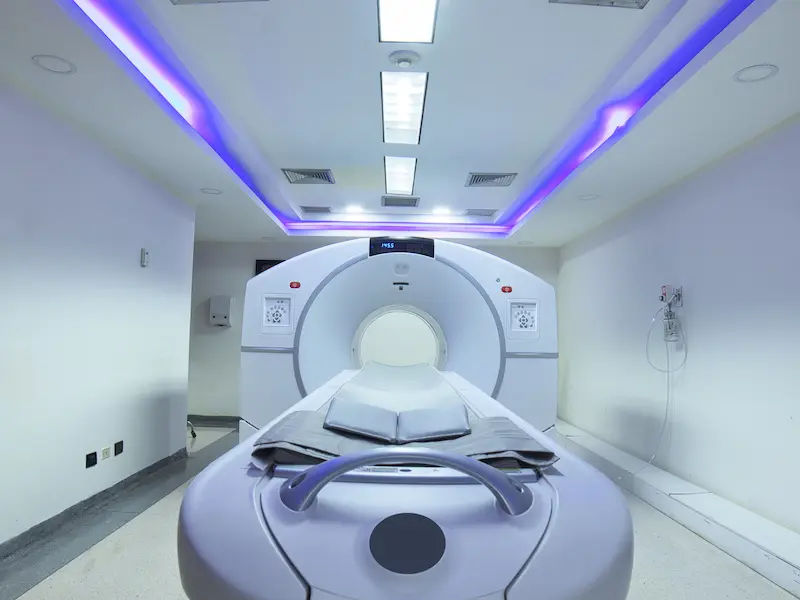When Should Kids Get a CBC Test? Signs to Watch For
Understand when your child might need a Complete Blood Count (CBC) test. Learn the key signs and symptoms like persistent fatigue, frequent infections, or unexplained bruising that may indicate a need for this important diagnostic tool.


Seeing your child feeling unwell can be unsettling, especially when symptoms like frequent fevers, tiredness, or repeated infections don’t seem to go away. In such cases, your paediatrician may recommend a Complete Blood Count (CBC) test. While the idea of a blood test might feel overwhelming, understanding what a CBC measures and why it’s important can help you make confident decisions about your child’s care.
A CBC is a simple yet powerful test that gives a detailed look at your child’s blood cells. It can help detect conditions like anaemia, infections, or immune system issues, often before they show up clearly in a physical exam. Ignoring ongoing symptoms or delaying testing could mean missing the chance to catch a treatable condition early. This guide will explain what a CBC test is, when it’s typically recommended for children, and which signs may suggest it’s time to ask your doctor about it. With the right information, you can feel more prepared to support your child’s health and well-being.
Common Symptoms That Warrant a CBC in Children
Your paediatrician might recommend a CBC for various reasons, whether your child has specific symptoms or as part of a routine check-up. As a parent, knowing these common scenarios can help you communicate effectively with your doctor.
You should consider a CBC for your child if they experience:
- Persistent or High Fever: While fevers are common in children, if a fever is high, lasts for several days, or is accompanied by other concerning symptoms, a CBC can help determine if an infection is present and what type it might be (bacterial vs. viral).
- Unexplained Fatigue or Low Energy: If your child seems unusually tired, lacks their usual energy for play, or is constantly drowsy, a CBC can screen for conditions like anaemia (low red blood cell count), which is a common cause of fatigue.
- Frequent or Recurrent Infections: If your child seems to catch every cold, flu, or other infection that goes around, or if infections are unusually severe, a CBC can provide insights into their immune system's strength by looking at white blood cell counts.
- Pale Skin or Dark Circles Under Eyes: These can be subtle signs of anaemia, indicating a need for a CBC.
- Unexplained Bruising or Bleeding: If your child bruises easily, has frequent nosebleeds, or unusual bleeding, a CBC will check their platelet count and other clotting factors.
- Poor Appetite or Unexplained Weight Changes: These can sometimes be linked to underlying health issues that a CBC might help identify.
Book Complete Blood Count (CBC)
Ideal Age and Frequency for Checkups
The ideal age for a CBC test depends on individual circumstances and your paediatrician's recommendations. Often, a CBC is part of routine check-ups during infancy, toddlerhood, and then again before starting school or during adolescence if specific concerns arise.
The frequency of testing will vary based on your child's health history, any ongoing symptoms, and risk factors. For generally healthy children, a CBC might not be needed annually, but if there are concerns about fatigue, recurrent infections, or growth, your paediatrician might recommend it more often. Always consult with your healthcare provider to determine the most appropriate testing schedule for your child.
How to Prepare Your Child for Blood Tests
The idea of a blood test can be scary for children. Here are some tips to help make the experience as smooth as possible:
- Explain the process: Talk your child through what will happen, such as a gentle blood draw, to ease anxiety.
- Schedule wisely: Choose a time when your child is well-rested and has eaten, unless fasting is required.
- Bring a comfort item: A favourite toy, book, or music can help distract and relax them.
- Offer praise and reassurance: Gentle encouragement and affection before, during, and after the test can make a big difference.
What Doctors Look for in Pediatric CBC Reports
A CBC report will show numerical values for each blood component, along with reference ranges. Your paediatrician will interpret these results together, considering your child's age, symptoms, and medical history. Here's a look at what the key markers can indicate in relation to fever, infections, and fatigue:
Red Blood Cells (RBCs) and Related Indices (Haemoglobin, PCV, MCV, MCH, MCHC, R.D.W*)
What they measure: These values indicate the oxygen-carrying capacity of your child's blood. Haemoglobin is the protein in RBCs that carries oxygen, and PCV (Packed Cell Volume) is the percentage of red blood cells in the blood. MCV, MCH, and MCHC provide details about the size and haemoglobin content of individual red blood cells, while R.D.W* (Red Cell Distribution Width) indicates variation in their size.
What do the results mean?
- Low levels (anaemia): A common cause of fatigue and weakness in children. It can also make them appear pale. Anaemia can be due to iron deficiency (most common), vitamin deficiencies, or other underlying conditions.
- High levels: Less common, but can sometimes indicate dehydration or other underlying issues.
White Blood Cells (WBCs) and Differential (TLC, Neutrophils, Lymphocytes, Eosinophils, Monocytes*, Basophils*, etc.)
What they measure: The total number of WBCs (TLC) and the breakdown into different types (Neutrophils, Lymphocytes, Monocytes*, Eosinophils, Basophils*), including their absolute counts. Each type plays a specific role in fighting different kinds of infections. The Neutrophil Lymphocyte Ratio (NLR) is also calculated.
What do the results mean?
- High WBC count (Leukocytosis): Often indicates an infection (bacterial, viral, or fungal) or inflammation. The specific type of WBC that is elevated can help narrow down the cause (e.g., high neutrophils often suggest bacterial infection, high lymphocytes suggest viral infection).
- Low WBC count (Leukopenia): Can indicate a weakened immune system, certain viral infections, or issues with bone marrow production, making a child more susceptible to infections.
- Abnormal differential: An unusual pattern in the types of WBCs or presence of immature forms (Blasts*, Pro-myelocytes*, Myelocytes*, Meta-myelocyte*, Bands*) can point to specific types of infections, allergic reactions, or more serious conditions affecting the bone marrow.
Platelet Count and Related Indices (MPV, PDW, PCT)
What it measures: The total number of platelets in your child's blood, along with their mean platelet volume (MPV), platelet distribution width (PDW), and plateletcrit (PCT).
What do the results mean?
- Low platelet count (Thrombocytopenia): Can lead to easy bruising or bleeding (e.g., nosebleeds, bleeding gums). This might be due to viral infections, certain medications, or more serious conditions.
- High platelet count (Thrombocytosis): Less common, but can sometimes occur after an infection, inflammation, or due to other underlying causes.
*Optional Tests: Some components marked with an asterisk (*) are conditional or optional tests. Their inclusion in the report depends on the results of other primary CBC parameters or specific clinical indications, allowing for a more targeted and detailed analysis when needed.
The results from a CBC test, combined with your child's symptoms and medical history, will help your paediatrician accurately diagnose the cause of their fever, infections, or fatigue. This detailed understanding allows them to create a targeted treatment plan designed to help your child feel better and stay healthy.
Get These Tests If You've Dengue
Book Child CBC Tests via Apollo 24/7
If your paediatrician recommends a CBC test for your child, choosing a reliable and convenient testing service is important. Apollo 24|7 makes this simple by providing accurate lab tests with quick results. This helps you and your doctor understand your child's health clearly and create a personalised plan to support their well-being effectively.
Why Choose Apollo 24|7 for Your Child's Health Checkups?
- Comprehensive Test Panels: Apollo 24|7 offers Complete Blood Count (CBC) panels that cover all essential markers for thorough assessment of a child’s fever, infections, and fatigue.
- NABL-Accredited Labs: Tests are done in labs certified by the National Accreditation Board for Testing and Calibration Laboratories (NABL), ensuring accurate and trustworthy results.
- Home Sample Collection: Enjoy the convenience of blood sample collection at your home, saving you time and providing privacy.
- Easy Online Booking: Schedule your test quickly and easily through the Apollo 24|7 app or website.
- Fast Digital Reports: Receive secure, detailed test reports online promptly, ready to share with your paediatrician.
- Trusted Brand: Benefit from the trusted expertise and healthcare legacy of Apollo Hospitals Group, one of India’s most respected medical networks.
By choosing Apollo 24|7, you get access to dependable, convenient diagnostic services that make it easier to understand and manage your child's health effectively.
Conclusion
The Complete Blood Count (CBC) is an invaluable diagnostic tool for parents and paediatricians alike. It provides crucial insights into your child's blood health, helping to pinpoint the causes of common concerns like fever, infections, and fatigue.
Understanding what a CBC measures and when it's recommended empowers you to be a proactive participant in your child's healthcare. This test helps your doctor accurately diagnose underlying issues, allowing for tailored interventions that support your child's energy, immune strength, and overall healthy development. If your child is experiencing persistent or concerning symptoms, consult their paediatrician to discuss whether a CBC test can provide the answers you need.
Get These Tests If You've Dengue
₹419(₹1047)60% off
₹379(₹948)60% off
₹289(₹723)60% off
₹289(₹723)60% off
₹699(₹1748)60% off
₹699(₹1748)60% off




.webp)

